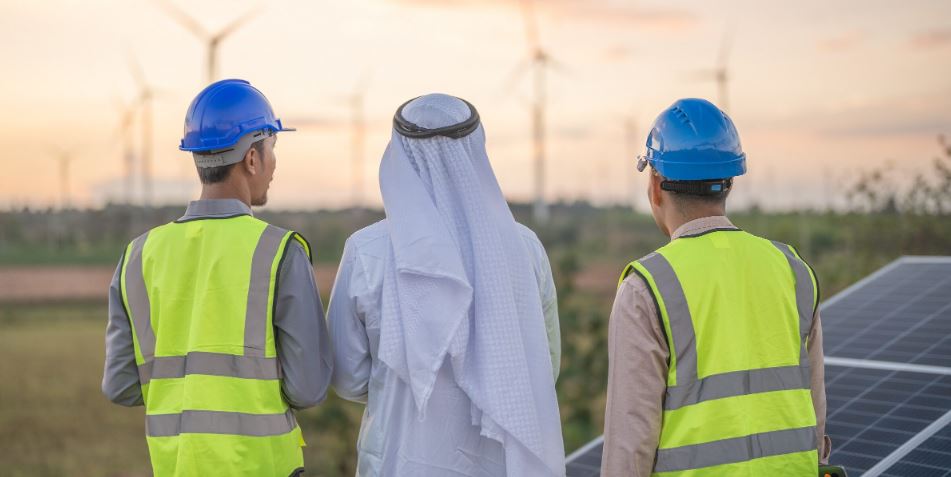From Oil Wealth to Green Future: Addressing the Energy Transition in Saudi Arabia (2020)
Solar Energy and Energy Transition in Saudi Arabia Dissertation – Saudi Arabia, a major oil exporter with a significant dependence on non-renewable energy, faces a pressing need to transition towards sustainable energy sources. With the majority of its revenue stemming from oil exports and proven oil reserves estimated to last for about 70 years, the country grapples with an increasing energy crisis.
This dissertation explores the imperative for the Saudi Arabian government to undertake strategic measures to reduce reliance on non-renewable energy, particularly due to its adverse impact on public health. The research emphasizes the prevalence of chronic pulmonary disorders among the population, linking them to the use of non-renewable energy sources. To address this issue, the study proposes the installation of solar panels on rooftops in Jeddah. Unlike previous research, this study evaluates the efficiency of solar panels during nighttime and rainy days, aiming to ensure a continuous and reliable energy supply.
Primary and secondary research methods are employed to investigate the feasibility of rooftop solar panel installations. Primary research, involving household surveys, reveals a positive inclination towards using solar panels for electricity generation, provided they do not compromise existing infrastructure. The proposed research aligns with the Saudi Arabian government’s ambitious plan to invest approximately forty-seven billion dollars over the next three years in installing photovoltaic cells to meet 10% of the total power demand.
Focused on Jeddah due to its abundant sunlight exposure, the study anticipates that the government’s support for conventional electricity generation may extend to the proposed solar power project. By strategically addressing climatic and demographic barriers, the government can effectively intervene to facilitate the transition to renewable energy sources.
In conclusion, the dissertation highlights the opportunity presented by the installation of rooftop solar panels in Jeddah. Capitalizing on the high availability of solar energy and positive household attitudes towards this renewable source, the project aims to provide a continuous and sustainable electricity supply. Ultimately, this transition has the potential to alleviate the non-renewable energy crisis in Saudi Arabia and contribute to a greener and more sustainable future.
- 20,000 words – 94 pages in length
- Excellent use of literature
- Good analysis of subject area
- Well written throughout
- Ideal for construction management students
1 – Introduction
Research Scope
Research Significance
Dissertation Rationale
Problem Statement
Responsibility of The Residents of Saudi Arabia of Using Renewable Sources of Energy
Dissertation Aim and Objectives
2 – Literature Review
Current Planning of Saudi Arabia Regarding the Use of Non-Renewable Sources of Energy
Significance of Domestic Installation of Solar Panels
Use of Semiconductors
Conduction of Electricity and Energy Bands
Semiconductors in Solar Panel
Monocrystalline Silicon Solar Cells
Crystalline Silicon Cells with Their Advantage and Disadvantage in Generating Solar Energy
Thin Film Solar Cells with Their Advantage and Disadvantage in Generating the Solar Energy
Diffusion and Adoption Protocol
Robert and Urban Model of Rooftop Solar Systems
Photovoltaic Modules in Generation of Solar Energy
Photovoltaic System and Solar Panel
Power Conditioning Equipment
Photovoltaic Arrays
Irradiance on The Solar Collector Plane
Grid Connected Rooftop Solar Systems
Inverters in Grid-Connected Solar Panels
Advantages and Disadvantages of Grid-Connected Solar Panels
Demand of Distributed Power Supply
Organic Photovoltaic Technologies
Credibility of Organic Photovoltaic Technologies in Domestic Power Grids
Literature Gap
3 – Project Scope
4 – Research Methodology
Research Philosophy
Research Approach
Research Design
Data Collection Tools and Techniques
Data Analysis Tools and Techniques
Primary Market Research
Stakeholders Analysis
Costing and Financing
5 – Economic Status of Saudi Arabia and Its Ability to Produce Solar Energy
Energy Generation
Economics of Solar Energy
Solar Energy Government Involvement
Need for Production of Alternative Energies
The Environmental Condition of Saudi Arabia
Drivers of Renewable Energy in Saudi Arabia
Domestic Energy Demand in Saudi Arabia
Rise in Power Demands and Natural Sources
Significance of Oil Reserves in Implementing Energy Shift
Value Proposition to Reduce Carbon Dependency
Preservation of Contingency and Regulation
6 – Market Analysis of Renewable Energy Demand
Analysis of The Current Market
Choice of Alternate Power Sources
Participation of Local Human Resource
Compliance of Domestic Use of Solar Power
Project Constraints
SWOT Analysis
Work Breakdown
Gantt Chart
PESTLE analysis
Project Specification
Material and Technology Costs
Cash Flow
Simulation of On-Grid Solar Energy Consumption
Compliance of Supplementary Services
FORSA Design
Risk Analysis
Environmental Impact Assessment
Air Quality and Greenhouse Gases
Electron Fission from the Power Grid
7 – Generation of Energy
Significance of Renewable Sources of Energy
Saudi Arabia and Non-Renewable Sources of Energy
Saudi Arabia and Its Solar Form of Energy
Biomass-Based Solar Panels
Solar Photovoltaics
Types of Solar Technology
Demand for Solar Energy in Saudi Arabia
Proposed Uses of Solar Panel in Large Projects
8 – Funding and Costing
Sources of Finance
Finance Sources
Financial Expenditure
9 – Conclusion and Recommendation
Conclusion
Objective Alignment
Recommendation
Future Scope
References
Appendices
Survey Questions
Cash Flow Statement

